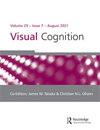视觉空间统计学习障碍伴数学学习困难
IF 1.7
4区 心理学
Q3 PSYCHOLOGY, EXPERIMENTAL
引用次数: 0
摘要
摘要从重复经验中快速提取时间和空间模式被称为统计学习(SL)。对SL的研究表明,在暴露几分钟后,观察者会发现隐藏在一系列或一系列物体中的规律。先前的研究结果表明,视觉空间统计学习可能与数值处理机制有关。因此,本研究首次考察了一个数字系统缺乏的群体中的视觉空间SL:有数学学习困难(MLD)的个体。32名女性参与者(16名患有MLD,16名匹配对照)接受了视觉空间统计学习任务测试。结果显示,MLD组的视觉空间SL明显比对照组差,尽管MLD在视觉辨别任务中的表现与对照组一样好。此外,对照组显示可靠的视觉空间SL高于机会,而MLD组则没有。由于习得的规律可以广泛促进认知处理,因此患有MLD的个体可能会在数字困难之外遭受额外的行为挑战。本文章由计算机程序翻译,如有差异,请以英文原文为准。
Impaired visuo-spatial statistical learning with mathematical learning difficulties
ABSTRACT Rapid extraction of temporal and spatial patterns from repeated experience is known as statistical learning (SL). Studies on SL show that after few minutes of exposure, observers exhibit knowledge of regularities hidden in a sequence or array of objects. Previous findings suggest that visuo-spatial statistical learning might relate to numerical processing mechanisms. Hence, the current study examines for the first time visuo-spatial SL in a population with a deficiency in the numerical system: individuals with mathematical learning difficulties (MLD). Thirty-two female participants (16 with MLD and 16 matched controls) were tested on a visuo-spatial statistical learning task. The results revealed that visuo-spatial SL was significantly worse in the MLD group than in a control group, although MLD performed as well as controls in a visual discrimination task. In addition, whereas the control group showed reliable visuo-spatial SL above chance, the MLD group did not. Because learned regularities can broadly facilitate cognitive processing, individuals with MLD may thus suffer from additional behavioural challenges beyond their numerical difficulties.
求助全文
通过发布文献求助,成功后即可免费获取论文全文。
去求助
来源期刊

VISUAL COGNITION
PSYCHOLOGY, EXPERIMENTAL-
CiteScore
4.20
自引率
10.00%
发文量
29
期刊介绍:
Visual Cognition publishes new empirical research that increases theoretical understanding of human visual cognition. Studies may be concerned with any aspect of visual cognition such as object, face, and scene recognition; visual attention and search; short-term and long-term visual memory; visual word recognition and reading; eye movement control and active vision; and visual imagery. The journal is devoted to research at the interface of visual perception and cognition and does not typically publish papers in areas of perception or psychophysics that are covered by the many publication outlets for those topics.
 求助内容:
求助内容: 应助结果提醒方式:
应助结果提醒方式:


